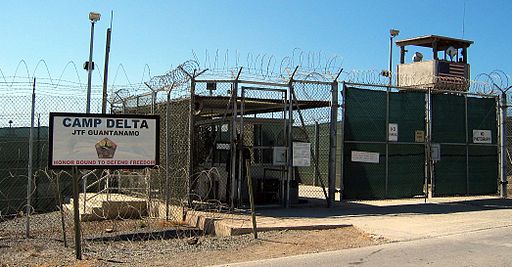President undermined his own plan to shutter the notorious facility by agreeing to the “defense” bill
By Sarah Lazare, staff writer for Common Dreams. Published 11-11-2015
After President Barack Obama agreed on Tuesday to sign a $607 billion “defense” bill that undermines his own plan to shutter the U.S. military prison at Guantánamo Bay, media outlets sounded the death knell for hopes that the facility will close before his term ends in 2017.
But Omar Shakir, a Bertha fellow at the Center for Constitutional Rights, told Common Dreams that the president, in fact, still retains the ability to close the prison—and must act now to fulfill his repeated pledges.
“Obama has been able and continues to be able to transfer the men cleared for release by every security and intelligence agency,” Shakir said over the phone from Guantánamo where he is meeting with clients. “It is in his power to accelerate the pace of periodic review boards. He has the ability through the Department of Justice to ensure that those who face trial do so in fair proceedings in federal court.”
“Obama has failed to follow through with his campaign promises and commitments to close Guantánamo by taking concrete steps while in power to articulate and execute a vision,” Shakir continued. “In the vacuum we have seen opportunistic politicians from both sides of the aisle using Guantánamo as a tool for their own purposes at the expense of the critical principles of due process and freedom, holding men without charge in indefinite detention without end.”
The National Defense Authorization Act, which was overwhelmingly passed by the Senate on Tuesday, includes a ban on transferring men held in Guantánamo to U.S. prisons—a cornerstone of Obama’s plan to shutter the facility. Some, however, have argued that the congressional ban on transfers to the U.S. is constitutionally invalid.
Of the 112 men who remain, 53 have been cleared for release—83 percent of them Yemeni. Meanwhile, 49 are awaiting clearance and currently going through the periodic review process. Ten are in the military commissions system, with 7 on trial and three convicted.
The U.S. has long claimed that the location of the Guantánamo prison in Cuba allows them to detain “War On Terror” prisoners without granting them due process or legal protections, including those against torture.
But Shakir emphasized that Obama’s plan to transfer some of the men to U.S. soil would not fully address “the tragedy at the heart of Guantánamo.”
In part, this is because it would still involve moving the men to the U.S. without formal charges being brought against them—in continuation of their indefinite detenion. What’s more, they would still likely face a military commission—if and when they faced trial.
“On the point of transfer to the U.S., the U.S. wants to hold people in the U.S. without charge, indefinitely detain them, without any sort of due process,” he said. “They would be placed in a black hole where they are not subject to any sort of legal process. These are people who have been held without charge for years on end. The plan would relocate people for another U.S. president.”
“There is significant concern among many in Guantánamo about their ordeals continuing for years on end,” Shakir continued. “Many have lived there for 14 years, not only not knowing why they’re there, but also not knowing when they may exit. One can only imagine the torment and mental anguish caused by being told you have been cleared for release, but having no idea when you will be released, and knowing the control of your fate is not in your hands, but in the hands of political forces.”
Indeed, the men detained at the prison have long protested their confinement using the tools at their disposal, including hunger strikes. While a long-standing U.S. media blackout makes it difficult to know just how many people are engaging in peaceful protest, Shakir said it is “well known” that long-term hunger strikes continue.
One of Shakir’s clients, a Yemeni man Ghaleb Nasser Al-Bihani, has reportedly faced retaliation for participating in hunger strikes to protest his detention without charge or trial for 14 years—a third of his life.
“All I think about is the day my freedom will be given back to me, for it will be the day of my re-birth,” Al-Bihani said in December 2013. “I want to become a father and hold my baby in my arms, and provide for my family and to my child.”



I spent over two years in Gitmo (long before there was a Camp Delta). There were hundreds of expatriate Cubans stuck on the base – could not go home and could not go to the U.S. What misery can’t governments inflict? As far as being held (anywhere) without charge and without due process, this is what eventually awaits the rest of us. “Preview of Coming Attractions” as it were. Anyone who has not read “The Trial” by Franz Kafka – I heartily suggest that you do.